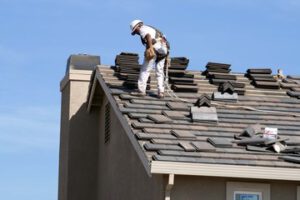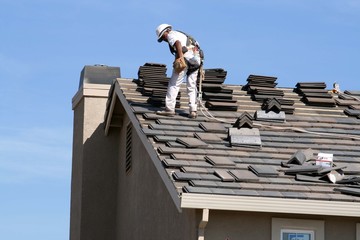Roofers often serve a variety of functions, from working on insurance claims to performing roof inspections for real estate companies. Regardless of the job type, choosing the right roofing company for your project is important.
Many homeowners are hesitant to hire Roofing Companies that haven’t built up an online reputation. However, a few key indicators can help you determine if a roofing company is legitimate.
Homeowners look for quality workmanship when selecting a roofing company to hire. They want to ensure that their roof will last a long time and that they are happy with the work performed. Creating a business that delivers high-quality service will help you get more customers and increase profits. A healthy profit will also give you the funds to invest in marketing and advertising.
Many people think a website is all you need to get the word out about your business, but it’s not enough anymore. You need to create a business page on all the major social media platforms and include SEO for local searches. This will make it easier for potential customers to find your business online.
Getting the word out about your roofing business is essential to building trust and attracting customers. You can do this by promoting specials, highlighting customer reviews, and posting pictures of your recent projects. Creating an email newsletter is another great way to reach out to current and prospective clients. People check their emails often, and they appreciate being updated with offers, tips, and other information.
You should also consider using an automated system for scheduling and estimating jobs. This will save you a lot of time and money and will help you improve your productivity. Moreover, you should consider investing in ladder safety training for your employees. Ladders are a common cause of workplace accidents, so it’s important to educate your workers on how to use them safely.
When you’re evaluating a roofing company, ask them for references from previous clients. This will help you determine whether they are reputable and experienced. You can also check their website for reviews and ratings. It’s also a good idea to ask for a free estimate, which will allow you to compare prices and services.
You should also avoid companies that try to hide their contact details on their websites. You should be able to see the roofing company’s address, phone number, and email address on their website. In addition, you should read through their reviews to determine if they have any complaints. If you see multiple complaints, it’s a good sign that the company is not trustworthy.
Insurance Coverage
Roofing companies have unique insurance needs due to the hazardous nature of their work. Whether the company works independently or hires employees, it’s likely to need liability coverage that protects against bodily injury and property damage claims. Additionally, it may need commercial general insurance for lawsuits filed over defective workmanship and business interruption costs. Errors and omissions coverage (sometimes referred to as professional liability insurance) can also help pay for legal fees, settlements, and judgments when a customer sues over the quality of the roof or repairs.
Regardless of how careful a roofing contractor is, accidents can occur. When someone is hurt on the job, medical bills and lost wages can be expensive for a small business. Depending on the state, roofing contractors may be required to carry workers’ compensation insurance for employees. Regardless, this policy is a wise investment for any roofing business that employs people.
Commercial general liability insurance for roofing contractors provides important protection if someone is injured by falling debris or if a faulty roof causes damage to the interior of a building after construction. These policies usually have $1 million or $2 million per occurrence limits, although higher amounts can be purchased.
It’s also wise for a roofing company to consider business property and tools and equipment coverage. This type of insurance protects the value of a company’s office and warehouse as well as equipment such as ladders, shingles, drills, hammers, computers, air compressors, circular saws, and reciprocating saws. The coverage may also include a theft clause that pays for the cost to replace stolen items.
Lastly, roofing businesses may also need crime insurance. This policy reimburses a business for the financial loss of cash, money orders, checks, credit card payments, and electronic transfers. It can also cover the cost of replacement of merchandise and inventory that is stolen from a storage facility or from a worksite. Some policies also provide coverage for a company’s computers and other electronics that are stolen or damaged while in transit or at a job site. This is often included in a combined commercial property and general liability policy.
Financing Options
Many homeowners want to avoid paying for a new roof with cash, and they may find the option of financing the project appealing. However, it’s important to consider the different financing options before choosing one. These can include personal bank loans, home equity loans and lines of credit, FHA 203(k) or FHA Title 1 loans, and even a credit card.
Roofing companies sometimes partner with lenders to offer in-house financing. These types of loans are typically unsecured personal loans and will have similar qualifications, approval timelines and interest rates to those of standard personal loans. In some cases, these lenders can also provide a home improvement financing calculator to help homeowners estimate their loan costs and payments.
A home equity loan or line of credit is a good option for those with sufficient equity built up in their homes and who are comfortable taking on more debt. These loans can have a lower interest rate than a traditional mortgage and are typically fixed-term loans with a variable repayment period. Home equity loans can also be used to pay for home renovation projects, including replacing the roof.
Another way to finance a roof is through a refinance of an existing mortgage. This method can be costly, though, and will require enough equity to cover the cost of the new roof. It is also wise to consider if the repairs or replacement are covered by your homeowners insurance policy or a home warranty.
Finally, a credit card can be an option for those with a strong credit history and enough income to make monthly payments. However, it’s important to remember that credit cards typically have higher interest rates than other forms of financing and can result in late fees and high interest charges if the monthly payment is not made.
Some states also offer tax rebates and incentives for homeowners to install a new roof. These are usually only available for those with a certain level of credit or income, and can be helpful for those who can’t afford to finance the entire cost of their roof.
Warranties
Roofing is one of the most significant investments any homeowner can make, and homeowners want to feel comfortable with the work that is done. The warranty system allows you to rest assured that your roofing company stands behind the quality of their work and will correct any mistakes made during the installation process. The type of warranties that roofing companies offer vary between different roofing contractors and manufacturers, with the most common being standard manufacturer warranties and workmanship warranties.
A standard manufacturer warranty is one that covers the manufacturing of shingles or metal, and can range from a few years to several decades. Typically, these only cover defects in the material itself, and do not address issues such as wear and tear or even improper installations. Adding a workmanship warranty to the mix will cover any issues that aren’t covered by the standard manufacturer’s guarantee, and can help ensure that if your roof suffers from an installation error, you’re not left with costly repairs that you’re responsible for paying.
Most reputable roofing contractors will also offer their own workmanship guarantees that will help protect you from the possibility of any problems with your new roof. Workmanship warranties are more difficult to explain than manufacturer guarantees, and they’re essentially the roofing contractor’s promise that they will install your new roof correctly the first time. Unlike the manufacturer’s warranty, the length of the workmanship warranty is up to the roofing contractor and can’t be dictated by the manufacturer.
In some cases, it may be necessary to transfer the warranty from one homeowner to another, and this is something that needs to be addressed in advance. You will likely have to provide the date of installation, receipts or other proof of purchase, and a copy of the deed or closing documents indicating the previous and current owner of the property. You may also have to pay an administrative fee and notify the manufacturer of the transfer within a specific time frame. It is important to understand the terms and conditions of a manufacturer’s warranty before you sign on, as these will often have various stipulations that can affect your coverage.

